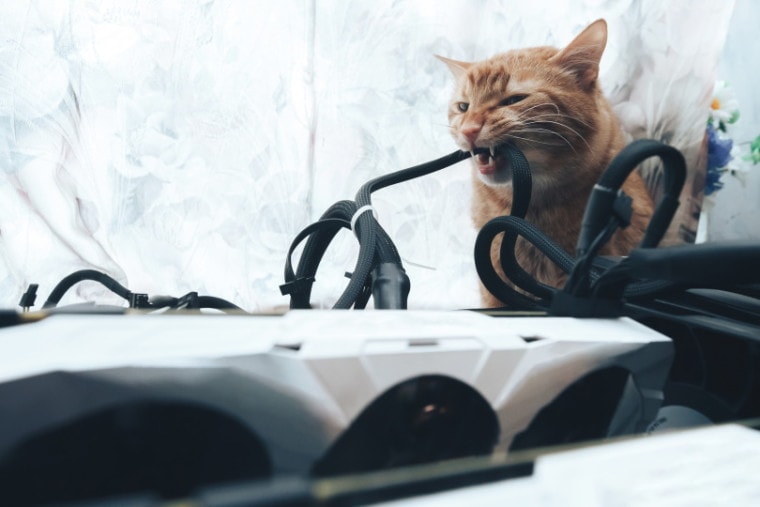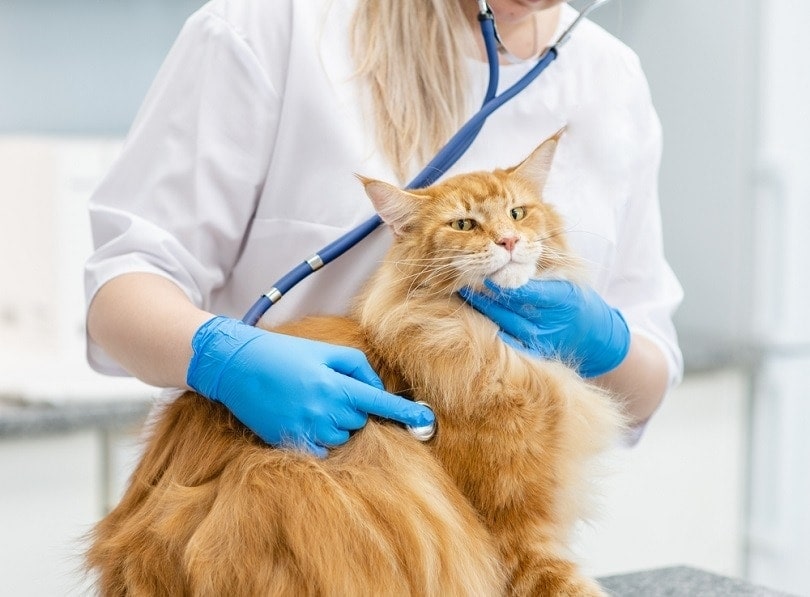
Suppose that after a long day of work, you settle into your new reclining couch, press the button to elevate your feet, and…nothing happens. You investigate the situation and find that your agile feline friend has slithered under the couch and chewed the power cord to your recliner! Thankfully, your cat seems uninjured, but now you’re stuck with an annoying situation—plus, who knows if your kitty will be so lucky next time.
Chewing electrical cords is not only expensive and troublesome for cat owners but it can be extremely dangerous for the cats themselves. If your cat has developed this worrying habit, here are seven proven methods to stop your cat from chewing electrical cords.
The 7 Ways to Prevent Your Cat from Chewing Electrical Cords
1. Cover the Cords in Something Bad-Tasting
One way to deter your cat from chewing electrical cords is to smear the cords in something that tastes bad to cats. You could try a commercial anti-chew product or something like hot sauce or citrus oils. This method might take some trial and error as you figure out what tastes bad enough to keep your cat away from the cords.

2. Use a Cord Protector
Many different cord protection products are available at home improvement stores. These are usually hard plastic or thick rubber items that encase the electrical cords to prevent cats from damaging the actual cord. Very determined chewers may still be able to destroy some of these products but it’s worth a try to see if they work on your cat.
3. Attach Dangling Cords
In many cases, cats chew cords because they find dangling or loose objects irresistible playthings. Fastening several loose cords together or attaching dangling cords securely to walls, floors or furniture can make it harder for your cat to have their fun and solve your chewing problem. As a bonus, you’ll be less likely to trip on the cords also!

4. Wrap Cords in Double-sided Tape
If you don’t have a lot of cords to protect, try wrapping them in double-sided tape. Cats won’t like gnawing on the sticky surface of the tape and may look elsewhere for a chew toy. This method can be time-consuming if you’re trying to cover a lot of cord length, and the sticky tape will also attract dirt and hair.
5. Run Cords Through PVC Pipe
Another time-consuming but effective method of keeping your cords safe is to run them through thin PVC pipes. This technique requires some planning and a bit of skill to measure, cut, and secure the piping, but even the most vigorous chewing cat is unlikely to break through this protective enclosure.

6. Give Your Cat More Attention
In some cases, your cat may be chewing cords because they’re bored or trying to get your attention. To try and curb this behavior at the source, make time to play and interact with your cat on one every day. Ensure your cat has plenty of toys, scratching posts, and hiding spaces to enrich their environment.
If your cat is left alone for long periods, consider hiring a pet sitter to visit your cat during the day. Leave the TV on to keep your cat company or even get another pet if you’re able and your cat is social towards other animals.
Regular play sessions can help your cat stay happy and healthy. Why not start the play with a fun toy like Hepper's Catnip Stick Toy? These sturdy toys are double-bagged, bite-proof, and filled with 100% organic catnip. Choose your favorite pastel color and treat your cat to hours of fun!
At Pet Keen, we've admired Hepper for many years, and decided to take a controlling ownership interest so that we could benefit from the outstanding designs of this cool cat company!
7. Offer Alternative Chew Objects
Try redirecting your cat’s chewing toward other, more appropriate objects. Some cats enjoy gnawing on cardboard, and you may be able to keep them happy by saving boxes from your latest online shopping spree. Numerous cat chew toys are also available for purchase. These toys come in various styles, materials, and sizes for casual to dedicated chewers. They can also help keep your cat’s teeth clean and their breath fresh.

 Why Chewing Electrical Cords Is Dangerous
Why Chewing Electrical Cords Is Dangerous
Chewing electrical cords can be dangerous not only to your cat but to your household as well. Chewed and damaged live electrical cords can be a legitimate fire hazard. Babies or small children could also be injured if they touch the chewed cords.
For cats, chewing electrical cords can be life-threatening. Cats can suffer tongue and mouth burns from chewing cords. They could also choke on cord parts or develop an intestinal blockage if they swallow them. Cats may even be electrocuted by the live wires. Kittens and young cats are most likely to chew cords and also be seriously hurt by doing so.
Signs of Electrical Injury in Cats
If you’re concerned your cat may have suffered an injury from chewing cords, they need to see a veterinarian as soon as possible. Electrical injuries can be both painful and dangerous. Here are some signs and symptoms you may notice if your cat has hurt themselves chewing electrical cords:
Electrocution can cause serious heart and lung damage to your cat. Don’t hesitate to call your veterinarian if you notice any of these signs.

Conclusion
Keeping your cat from chewing electrical cords may take a combination of techniques. Protect the cords to keep your cat safe as you work on redirecting their behavior or training them to avoid chewing altogether. No matter which method you pick to protect your electric cords, remember that harsh punishment is never an appropriate way to discipline your cat. If you are finding yourself frustrated or unable to change your cat’s behavior, seek advice from your veterinarian or a cat behavior specialist before you give up entirely.
Related reads:
Featured Image Credit: e-leet, Shutterstock



 Why Chewing Electrical Cords Is Dangerous
Why Chewing Electrical Cords Is Dangerous



